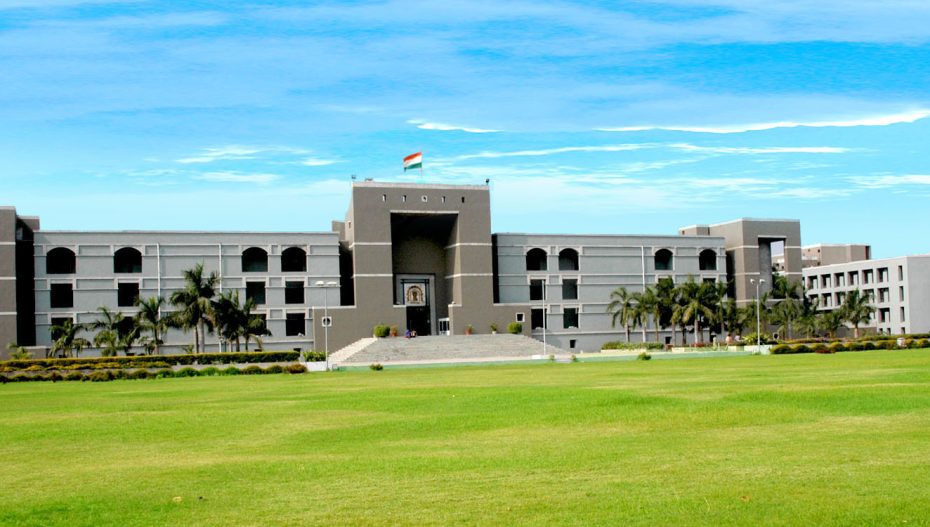The Gujarat High Court on Friday castigated the state government for lodging an FIR against a contractual sanitation worker for “wilfully” entering a tank despite a prohibition on manual scavenging. The court noted that such a responsibility cannot be put on the worker who is only resorting to such work to feed his family.
The court’s observation came as the division bench of Chief Justice Sunita Agarwal and Justice Aniruddha Mayee was hearing a public interest litigation by Ahmedabad-based NGO Manav Garima that is seeking strict implementation of the Prohibition of Employment as Manual Scavengers and their Rehabilitation Act, 2013.
In November 2023, a sanitation worker had died and another suffered serious injuries while cleaning a sewage tank on the Bhavnagar campus of Central Salt and Marine Chemicals Research Institute (CSMCRI). The court had earlier directed the state government to conduct an inquiry into the incident and submit a report of the same along with actions taken and actions proposed to be taken.
On Friday, based on the findings of a factual inquiry committee, the government counsel informed the court that the Bhavnagar Municipal Corporation (BMC) had not deployed a supervisor at the site of the incident despite it being mandatory. While a nodal officer is appointed by the civic body, he neither supervises nor has he appointed any supervisor for monitoring such works, it was submitted. The committee also suggested a departmental inquiry against the BMC executive engineer.
The panel went on to recommend that nodal officers be appointed from corporations “for frequent and regular investigations and audits of sewage tank cleaning works”.
However the suggestion did not impress the bench. “There is lacuna and slackness on part of the corporation… It says the supervisor of the corporation never remains present. There should be a nodal officer of the corporation. So who will make the inquiry? Corporation? For their own faults?” CJ Agarwal remarked.
Observing that the said septic tank was not safe for future cleaning, the inquiry revealed that it did not have a vent pipe through which hazardous gases could go out. The committee suggested “immediate corrective action in the construction of the tank and action against the institution for faulty construction”.
The committee found major lapses on the part of CSMCRI and recommended compensation to the tune of Rs 30 lakh to be paid to the heirs of the deceased.
The court has sought a personal affidavit from the principal secretary of the urban development and urban housing department with details of the action taken after the inquiry report findings.
Additionally, the committee recommended action against the surviving sanitation worker —Sureshbhai Garaniya — on the ground that despite several warnings from BMC officials, he “wilfully entered the tank” in the absence of the civic body team. He was periodically being employed by CSMCRI for cleaning sewage/septic tanks.
Given that he was taking up such work at the institute regularly, the committee concluded that he is “a regular offender” and the court was informed that BMC has filed an FIR against Garaniya for “irresponsible and ignorant behaviour”.
However, CJ Agarwal remarked, “Please don’t put this responsibility on the worker. He is only concerned about the money he gets; he is a contract worker. He knows he will not be able to feed his family if he is not doing those things that he was asked to do… He needs money so he is doing it. You cannot let it happen”.
Meanwhile, the PIL is also dealing with non-payment of compensation to the kin of those who died during manual scavenging between 1993 and 2014. In one such incident from Anand, the government had earlier pointed out that the kin were not paid as the deceased had not died due to inhalation of hazardous gases but because he had been buried under the sand during construction of a sewage pipeline. The court had sought a response from the Anand municipality in this regard.
On Friday, the municipality’s counsel reiterated before the court that the said incident was not a case of manual scavenging but rather a death during the construction work of a new sewage line. The contractor subsequently paid the family Rs 1.85 lakh in compensation, the counsel added.
The bench, however, stressed on the civic body’s vicarious liability to compensate as well.
“Why would you not compensate him? You are the municipality, you were the principal employer, you engaged the contractor, you cannot refuse to compensate him…For any mishap, any issue pertaining to people engaged by the contractor, the principal employer is equally liable. For any lapse of the contractor, you are vicariously liable…You have to pay in addition to what the contractor has paid,” CJ Agarwal remarked.
Also Read: 12 Steps To Get The Best From Your Walk













